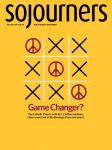“JUST WAR IS KILLING US! There is no just war.”
That proclamation by a Catholic sister from Iraq, and others like it, resounded at a Vatican gathering this spring and fell on surprisingly receptive ears.
Sister Nazik Matty, an Iraqi Dominican, joined others from around the world in Rome in April to wrestle with how the Catholic Church could “recommit to the centrality of gospel nonviolence.” She has watched members of her religious community die for lack of medical care during war.
“Which of the wars we have been in is a just war?” asked Sister Matty, who was driven from her home in Mosul by ISIS, also known by the Arabic acronym Daesh. “In my country, there was no just war. War is the mother of ignorance, isolation, and poverty. Please tell the world there is no such thing as a just war. I say this as a daughter of war.”
The Rome gathering on Nonviolence and Just Peace was unprecedented, bringing together members of the church hierarchy with social scientists, theologians, practitioners of nonviolence, diplomats, and unarmed civilian peacekeepers to discuss Catholic nonviolence and whether in the contemporary world armed force can ever be justified.
Of course, with such diverse participants, there was not a common mind on whether just war theory, a doctrine of military ethics used by Catholic theologians, has outlived its usefulness as church teaching.
Some of the academics and diplomats—particularly from the United States and Western Europe—maintained that just war criteria, when properly applied, are useful when working within halls of power, from the Pentagon to the United Nations, for restraining excessive use of military force by a state. One participant cautioned against “broad condemnations of just war tradition, if it means closing off dialogue with our allies.” Another questioned how diplomacy could continue without the just war framework as its common language.
But Catholics who came to Rome from conflict zones—Afghanistan, Iraq, Pakistan, Palestine, Colombia, Mexico, the Democratic Republic of Congo, Burundi, and Uganda—brought a different perspective.
Just war theory isn’t working
Popes preach peace. And yet Catholic teaching allows for the possibility of morally sanctified use of armed force. If preaching peace is to be more than righteous hand-wringing, then the church needs a viable alternative to war, one that doesn’t leave Catholics in one part of the world justifying war on Catholics in another part of the world.
“After Daesh/ISIS [took over the town] ... the church took responsibility for all of us,” Matty said. “It was encouraging to see such active presence of the church; not passive, but active. We can’t respond to violence with worse violence. In order to kill five violent men, we have to create 10 violent men to kill them. This encourages the spiral of violence up and up. And the people are so exhausted because they don’t know what’s happening. It’s like a dragon with seven heads. You cut one and two others come up.”
Therein lies the conundrum. Catholic just war criteria assume that a strategically applied use of violence under the right conditions will end violence, creating the possibility of peace. But in an era of weapons of mass destruction and borderless, serial conflicts, the approach no longer works. At least not from the perspective of those on the receiving end of the actions of the one remaining superpower.
“You [Americans] ask, can we talk to terrorists, can we talk to ISIS in Iraq? The answer is yes!” said Matty. “But our destiny as Christians in Iraq is not controlled by ISIS. It is controlled by the United States. ISIS in Iraq is a bunch of desperately hungry people who will kill for some bread. But if the rich people in the U.S., in Russia, in Europe stop arming them, then we will have life. We will live. Otherwise, we will die. If the rich want us to stay alive—as Christians in Iraq—then we will live. If the rich want us to die, then we will die.”
Hearing from people such as Sister Matty was a primary objective of the conference, according to Marie Dennis of Pax Christi International, co-convener of the Vatican gathering, and great care was taken to ensure that the majority of those present were engaged in active peacemaking in circumstances of violence. “We wanted to listen carefully to what people in those situations have to say,” said Dennis, a lead conference organizer, “about the place of nonviolence in our church teaching.”
What they had to say was clear: Just war theory isn’t working. They want leadership from the church on strategic nonviolence when militants come to town. They want training in conflict resolution. They want to study the principles of active peacemaking. They want Catholics to be part of unarmed civilian protection teams. They want bishops and priests to stand publicly against violence, to preach on gospel nonviolence, and to stand shoulder to shoulder with laity in the streets. They want, as Pope Francis puts it, “shepherds who smell like their sheep.”
Creating a theology of peace
Those gathered in Rome were picking up a conversation about whether it is ever theologically permissible to justify war, a debate that hasn’t been engaged at this level since Vatican II. Two key documents from the era of the Vatican Council—“The Church in the Modern World” (Guadium et spes, 1965) and “Peace on Earth” (Pacem in terris, 1963)—repudiated war, especially given the development of nuclear weapons. They advocated for a more comprehensive peace than that provided by a policy of “mutual assured destruction.”
The documents didn’t abolish just war teaching, but they succeeded in building a strong Catholic theology of peace. “Although the idea and theory of a just war has not officially been repudiated,” wrote Catholic ethicist Lisa Sowle Cahill for the conference, “no pope since the Council has approved a war, or even mounted a defense of the justice of war in principle.”
Italian Bishop Luigi Bettazzi was one of the youngest bishops present at the Council. “It was suggested during the Council that every war should be condemned,” said Bettazzi at this year’s Rome gathering. “That is what Pope John [XXIII] did when he claimed that thinking that wars can bring justice and peace was silly [alienum est a ratione, or “alien to reason”]. It was only with the arrival of the Council that total war—that in which civil population is affected—was condemned.”
Bishop Bettazzi added, “Now, every war is a total war, because they all affect the civil population, and therefore is against God and against humanity. [In this situation] a Catholic, a Christian, could never become a soldier.” Every Catholic, every Christian, he said, must be a conscientious objector to total war.
In the 50 years since the Council, two important things have happened.
One wing of the Catholic Church, startled by the strong peace message of Vatican II, pushed to embed just war criteria deeper into church teaching. Though just war theory had been a longstanding tradition for Catholics, it was not inserted into the catechism, the teaching principles of the church, until 1992.
Another wing of the church rose to embrace Pope Paul VI’s resounding call on the World Day of Peace in 1972: “If you want peace, work for justice!” Thousands of priests, religious, and lay people threw themselves into the work for social justice, economic development, and the promotion of peace as an expression of their Catholic faith.
These same Catholics watched as a broad school of Christian thought developed—predominately in Protestant and Anabaptist traditions—that judged just war to be obsolete and embraced the theology, principles, and practices of what has become known as “just peace.” This culminated in 2013 when the World Council of Churches, a body that represents more than 560 million Christians in Protestant, Orthodox, and other Christian denominations, announced that “by its calling and vocation the Christian church is to be a peace church.”
The tools of nonviolence
What if the world’s 1.2 billion Catholics—half of Christians today—did the same?
In Pope Francis’ letter to the Rome gathering, he echoed his predecessors but went a step further. He wants to activate the church of the poor, the church of the people. “Humanity needs to refurbish all the best available tools to help the men and women of today to fulfill their aspirations for justice and peace,” the pope said. “Accordingly, your thoughts on revitalizing the tools of nonviolence, and of active nonviolence in particular, will be a needed and positive contribution.”
Cardinal Peter Turkson, president of the Vatican justice and peace office and co-sponsor of the Rome convocation, underscored Pope Francis’ message and noted some historical pitfalls: “It would be dangerous to identify the gospel message with this or that political program,” with nationalism or ideologies. “The Christian contribution to peace must take a different path.”
Determining “a different path” is the challenge. The answer lies in recommitting to the centrality of gospel nonviolence and developing practices of Catholic nonviolence and just peace. But what are the “tools of nonviolence, and of active nonviolence in particular”?
When Pope Francis refers to nonviolence, he is not referring to anything passive. Terrence Rynne, founder of the Center for Peacemaking at Marquette University in Milwaukee, put it this way: “The topic at issue here is proactive, positive, nonviolent, strategic peacemaking—an emerging body of data, theology, and praxis that goes well beyond the false choices of justifying war or refusing to confront it.”
Just peace is an “orientation toward conflict transformation characterized by approaches that reduce violence and destructive cycles of social interaction and at the same time increase justice in any human relationship,” wrote sociologist John Paul Lederach. This is a new approach. A third way is emerging.
“The weapon of the church is love”
Bishop Paride Taban of South Sudan provides an example of what active nonviolence looks like. The Sudanese Catholic, an instrumental leader in the formation of the new country of South Sudan, laughs easily, delighting that, as he approaches his 80th birthday, he can still dance and tell jokes. It could have been otherwise.
Bishop Taban has lived through Africa’s longest-running civil war. “From 1955, when I was a student, then from 1964 to 1972, when I was a priest, and from 1983 to 2005, when I was a bishop, and even now—war,” he says. And he’s gone through it all as an unarmed Christian peacemaker.
Taban is quick to say that he never abandoned his people in war. “I was in the middle of the people, with the people, for the people,” he says, “because my motto as a priest was ‘help your brothers and sisters in their difficulties.’ I wanted to keep that motto myself.”
As a result, the Sudanese People’s Liberation Army, a militant group in the second Sudanese civil war, took him and three other priests captive for 100 days in 1999. They lived in the bush, eating dry maize and wild fruits. “They mistreated me until my body produced lice,” he recalls. “We carried water, cooked for the officers. But I forgave them and looked at them the way I used to gaze at my mother when I was a child. I forgave them.” Like so many of his people, he still suffers the trauma of his experience.
In the midst of a brutal sectarian war, Taban founded the South Sudan Council of Churches, which was vital in bringing about the 2005 peace accord, and which even now he works to maintain. His priests were trusted by all sides in the conflict, and all sides—government forces as well as rebels—committed horrible atrocities, including extrajudicial killings, enforced disappearances, and rape as a weapon of war.
“To be a person of nonviolence is to have impartiality,” Taban says. “Be impartial! Not neutral, impartial. Have great love for the people. Be a shepherd. A shepherd is one who has love for all the sheep. That is what Jesus taught us.”
Taban founded the 2,500-acre Holy Trinity peace village near the banks of the Kuron River, 170 miles east of Juba, South Sudan. “I wanted to build a place where different tribes, with generations of animosity, could live together and provide for themselves,” he said in a 2013 interview. When he started the village, Bishop Taban lived in a tent alongside 81 families. Now he has a small room, and the village has more than 3,000 people working productive fields. The village is a no-gun haven in a highly armed society.
“The weapon of the church is love,” says Taban. “The church is a mother and has a strong weapon: Love for everybody. In South Sudan, the church has been with all the people but never ever advocated for weapons. I destroyed all my guns that I used for hunting birds. The church has to be a place where there are no guns, and no fear.” Taban adds, “Whenever I am asked to turn over my weapons [at a checkpoint], I say: ‘My Lord has already come and taken them all away.’”
“We need a clear message”
Similar stories were shared by Catholics living between brutal militants in Colombia. “We faced radical opposition when we were working in the Magdalena region for 14 years,” says Francisco De Roux, a Jesuit priest.
“Our purpose was to accompany the regional communities in a program of development and peace in the middle of the conflict,” says De Roux. “But the paramilitaries assassinated 24 persons on our team, and the guerillas killed three of our companions.” Despite these violent attacks, De Roux says, “I am certain that because of the generosity of my companions, women and men, and due to the way they devoted themselves to protect life and dignity in extreme difficulties, the Magdalena process became a reference [point] in the construction of structural peace.”
There are now 24 programs for development and peace across Colombia, says De Roux, all of which contributed to the recent peace negotiations, and which will monitor and maintain the Colombian accords in the future. In August, De Roux offered himself as a hostage in exchange for Odin Sanchez, a former Colombian congressperson held captive by ELN guerilla forces.
Most of the participants who told these stories had little training in nonviolence, conflict resolution, or unarmed civilian peacekeeping; had not been taught a theology of nonviolence other than what they could glean from the gospels; and received scant support or protection from the institutional church.
“We need a clear message from the church—from the pope to the grassroots—that the church stands for nonviolence,” said South Sudan’s Bishop Taban. “We are the voice of the church, and we are coming here to say that this is the need of the church. We want an encyclical.” A major teaching document, along the lines of the Vatican’s work on climate change, could have a significant impact across the breadth of the Catholic Church and beyond.
In Rome, Mairead Maguire, winner of the 1976 Nobel Peace Prize, honed in on this point: “If we haven’t taught the church’s way of nonviolence, then we only leave people with two options: fight or flight.”
The just war tradition taught how to fight. The pacifist tradition, when constrained to a point of individual conscience, often resulted in flight.
Pope Francis has described our times as “World War III—but in installments.” Deadly conflict is increasing around the world, most significantly in the last five years. Vatican II’s predictions about “total war” are the stark reality of daily news. The church stands at a watershed: Will it reject the necessity of armed force? Will it counsel the state strongly and clearly against the use of violence? Will it promote active, effective alternatives to armed force? Will it confront the evil so clearly at work in the world with the sword of peace?
Effective alternatives to war
Across the world, effective alternatives to war are emerging. People are doing serious work to advance these alternatives, to mainstream them, and to scale them up. “Currently 12 international, nongovernmental organizations and many more local groups provide unarmed civilian protection in 17 areas of violent conflict,” says Mel Duncan, founding director of Nonviolent Peaceforce. In one year, Nonviolent Peaceforce trained more than 14,000 people in conflict-affected communities in unarmed civilian protection.
Just peace principles are becoming more robust. They have been applied in interfaith contexts, in arguing against drone warfare, in analyzing the global war on women, and by Catholic aid agencies providing service in conflict zones.
The conversation is no longer about justifying cases where armed force may be legitimized, nor is it about the pacifism of personal conscience. The focus is on marrying the vast amounts of peacemaking research, civil resistance tactics, and just peace principles with the deep, pervasive peace theology of the church.
Pope Francis named his agenda when he took the name of the saint from Assisi: a church of the poor, praise of creation, and gospel nonviolence.
Following the Rome conference, Pope Francis elevated the position of Cardinal Turkson’s council, giving it greater power and responsibility. He also announced the theme for the 50th celebration of the World Day of Peace on Jan. 1: nonviolence.

Got something to say about what you're reading? We value your feedback!

